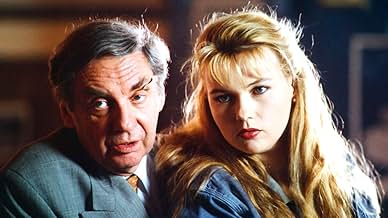Harald Juhnke(1929-2005)
- Actor
- Writer
- Composer
At the age of 15, Harald Juhnke was drafted into military service in the Second World War. After the end of the war he attended drama school. At the age of 24, Juhnke appeared on stage in Berlin for the first time. Three years later he took on his first film role in the film "Three Girls Are Spinning". In 1953 Juhnke married the dancer Sybil Werden, with whom he remained together until 1962. Together they became parents to their son Peer and daughter Barbara, who died at the age of 14 months. The mime now took on numerous film roles that justified his success. In 1972, Juhnke married his second wife, his girlfriend Susanne, who gave him his third child, son Oliver. In 1979, the actor achieved his final breakthrough on German television, where he hosted the TV show "Music is Trumpf" until 1982. Juhnke's achievements were awarded the "Golden Camera" in 1981. In 1983 he took over the moderation of the popular program "How about Revue today?".
The actor and TV star's track record began to suffer from unfavorable press reports in 1984: reports about Juhnke's alcoholism and the excesses associated with it increased. Nevertheless, Juhnke continued to shine in the artistic field. In 1992, Juhnke celebrated a huge success with a leading role in the film "Schtonk", which was about Adolf Hitler's fake diaries, in the role of the journalist Pit Kummer; The crowning achievement of the numerous international awards (German Film Prize in Gold, among others) was an Oscar nomination for "Best Foreign Film". In the same year he was awarded the "German Film Prize" and the "Bambi". In the 1990s, media coverage of the artist's private and health problems almost turned into a smear campaign. As alcohol addiction worsened, missteps in public also increased, with Juhnke becoming violent towards a reporter in Berlin around 1996.
In the same year he also received the "TeleStar" and the "Golden Camera" for his artistic achievements. Also in 1996, Juhnke shone in the TV film "The Captain of Köpenick". His appearance there is now one of the actor's most successful roles. In January 1997, Juhnke made the headlines because he skipped his appearance on a talk show due to excessive drinking. A month later, thoughtless racist comments in public resulted in his dismissal from Norddeutscher Rundfunk (NDR). Critical voices also called for a general ban on television appearances for the entertainer, who had become "unsustainable". After further alcohol escapades, Juhnke managed to temporarily overcome his addiction by staying in a clinic between 1997 and 2000. However, after the turn of the millennium, the actor succumbed to alcohol again.
In the years 2000 to 2001, several hospital and spa stays followed, which revealed Juhnke's poor health. Finally, on December 11, 2001, the actor's manager, Peter Wolf, announced that Juhnke would never appear in public again. In 2003, his wife Susanne Juhnke, with the support of the journalist Beate Wedekind, published her shocking and impressive memories of their life together with Harald Juhnke: "In good days and in bad days". In December 2004 it was announced that the actor, who suffered from dementia, had been admitted to hospital due to health problems.
Harald Juhnke died on April 1, 2005 as a result of his illness in Berlin.
The funeral service in the Berlin Memorial Church was attended by many fans and celebrities. Harald Juhnke was buried in an honorary grave in the forest cemetery in Dahlem.
The actor and TV star's track record began to suffer from unfavorable press reports in 1984: reports about Juhnke's alcoholism and the excesses associated with it increased. Nevertheless, Juhnke continued to shine in the artistic field. In 1992, Juhnke celebrated a huge success with a leading role in the film "Schtonk", which was about Adolf Hitler's fake diaries, in the role of the journalist Pit Kummer; The crowning achievement of the numerous international awards (German Film Prize in Gold, among others) was an Oscar nomination for "Best Foreign Film". In the same year he was awarded the "German Film Prize" and the "Bambi". In the 1990s, media coverage of the artist's private and health problems almost turned into a smear campaign. As alcohol addiction worsened, missteps in public also increased, with Juhnke becoming violent towards a reporter in Berlin around 1996.
In the same year he also received the "TeleStar" and the "Golden Camera" for his artistic achievements. Also in 1996, Juhnke shone in the TV film "The Captain of Köpenick". His appearance there is now one of the actor's most successful roles. In January 1997, Juhnke made the headlines because he skipped his appearance on a talk show due to excessive drinking. A month later, thoughtless racist comments in public resulted in his dismissal from Norddeutscher Rundfunk (NDR). Critical voices also called for a general ban on television appearances for the entertainer, who had become "unsustainable". After further alcohol escapades, Juhnke managed to temporarily overcome his addiction by staying in a clinic between 1997 and 2000. However, after the turn of the millennium, the actor succumbed to alcohol again.
In the years 2000 to 2001, several hospital and spa stays followed, which revealed Juhnke's poor health. Finally, on December 11, 2001, the actor's manager, Peter Wolf, announced that Juhnke would never appear in public again. In 2003, his wife Susanne Juhnke, with the support of the journalist Beate Wedekind, published her shocking and impressive memories of their life together with Harald Juhnke: "In good days and in bad days". In December 2004 it was announced that the actor, who suffered from dementia, had been admitted to hospital due to health problems.
Harald Juhnke died on April 1, 2005 as a result of his illness in Berlin.
The funeral service in the Berlin Memorial Church was attended by many fans and celebrities. Harald Juhnke was buried in an honorary grave in the forest cemetery in Dahlem.




















